Related Research Articles
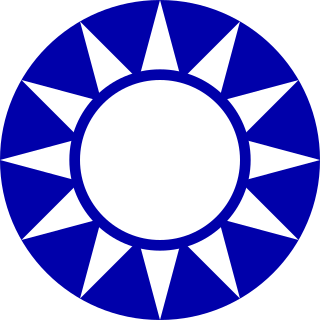
The Kuomintang (KMT),also referred to as the Guomindang (GMD),the Nationalist Party of China (NPC) or the Chinese Nationalist Party (CNP),is a major political party in the Republic of China,initially based on the Chinese mainland and then in Taiwan since 1949. The KMT is a centre-right to right-wing party and the largest in the Pan-Blue Coalition. Its primary rival is the Democratic Progressive Party (DPP) and its allies in the Pan-Green Coalition. As of 2024,the KMT is the largest single party in the Legislative Yuan. The current chairman is Eric Chu.

The "National Anthem of the Republic of China",also known by its incipit "Three Principles of the People",is the national anthem of the Republic of China,commonly called Taiwan,as well as the party anthem of the Kuomintang. It was adopted in 1930 as the national anthem and was used as such in mainland China until 1949,when the Republic of China central government relocated to Taiwan following its defeat by the Chinese Communist Party in the Chinese Civil War. It replaced the "Song to the Auspicious Cloud",which had been used as the Chinese national anthem before. The national anthem was adopted in Taiwan on October 25,1945 after the surrender of Imperial Japan. Mainland China,being governed by the People's Republic of China today,discontinued this national anthem for "March of the Volunteers".
The history of the Republic of China began in 1912 with the end of the Qing dynasty,when the Xinhai Revolution and the formation of the Republic of China put an end to 2,000 years of imperial rule. The Republic experienced many trials and tribulations after its founding which included being dominated by elements as disparate as warlord generals and foreign powers.

Feng Yuxiang,courtesy name Huanzhang (焕章),was a Chinese warlord and a leader of the Republic of China from Chaohu,Anhui. He served as Vice Premier of the Republic of China from 1928 to 1930. He was also known as the "Christian General" for his zeal to convert his troops and the "Traitorous General" for his penchant to break with the establishment. In 1911 he was an officer in the ranks of Yuan Shikai's Beiyang Army but joined forces with revolutionaries against the Qing dynasty. He rose to high rank within Wu Peifu's Zhili warlord faction but launched the Beijing Coup in 1924 that knocked Zhili out of power and brought Sun Yat-sen to Beijing. He joined the Nationalist Party (KMT),supported the Northern Expedition and became blood brothers with Chiang Kai-shek,but resisted Chiang's consolidation of power in the Central Plains War and broke with him again in resisting Japanese incursions in 1933. He spent his later years supporting the Revolutionary Committee of the Kuomintang.

The Revolutionary Committee of the Chinese Kuomintang is one of the eight minor political parties in the People's Republic of China under the direction of the Chinese Communist Party.

"Nanniwan" is a revolutionary song written in 1943 with lyrics by communist playwright and poet He Jingzhi and music by Ma Ke. It was made popular by the Chinese Communist Party and continues to be one of the most recognisable songs in the People's Republic of China.
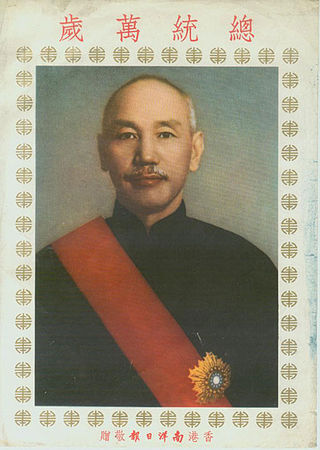
Propaganda in the Republic of China has been an important tool since its inception with the 1911 Revolution for legitimizing the Nationalist government that retreated from mainland China to Taiwan in 1949. Anti-communism and opposition to the Chinese Communist Party have historically been central to propaganda in the Republic of China.
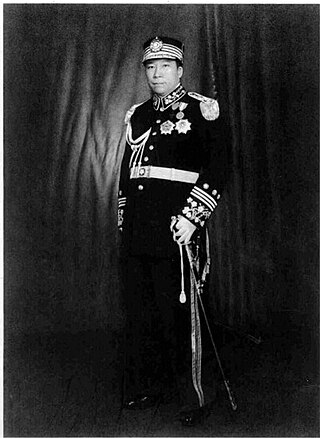
Yang Hucheng was a Chinese general during the Warlord Era of Republican China and Kuomintang general during the Chinese Civil War.

The National Protection War,also known as the Anti-Monarchy War,was a civil war that took place in China between 1915 and 1916. Following the overthrow of the Qing dynasty three years previously,the Republic of China was established in its place. The war was caused by President Yuan Shikai's proclamation of the Empire of China,with himself as the Hongxian Emperor.
The Tongzhou mutiny,sometimes referred to as the Tongzhou Massacre,was an assault on Japanese civilians and troops by the collaborationist East Hebei Army in Tongzhou,China,on 29 July 1937,shortly after the Marco Polo Bridge Incident,which marked the official beginning of the Second Sino-Japanese War.
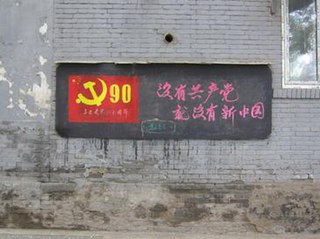
"Without the Communist Party,There Would Be No New China" is a Chinese Communist Party song,which originated in 1943 in response to the phrase,"Without the Kuomintang there would be no China".

Chu Minyi;was a leading figure in the Chinese republican movement and early Nationalist government,later noted for his role as Minister of Foreign Affairs in the collaborationist Wang Jingwei Government during World War II.
Hokkien pop,also known as Taiwanese Hokkien popular music,T-pop,Tai-pop,Minnan Pop and Taiwanese folk,is a popular music genre sung in Hokkien,especially Taiwanese Hokkien and produced mainly in Taiwan and sometimes in Fujian in Mainland China or Hong Kong or even Singapore in Southeast Asia. Hokkien pop is most popular amongst Hoklo people in Taiwan,Mainland China,Hong Kong,and the Overseas Chinese and Overseas Taiwanese in Southeast Asia,such as Chinese Singaporeans,Chinese Malaysians,Chinese Filipinos,Chinese Indonesians,etc.
The Battle of Yongjiazhen (雍家镇战斗) was fought during the aftermath of World War II in the Yongjiazhen (雍家镇) region of central Anhui,China between Communist forces and Kuomintang forces who had allied with the Japanese. The battle was part of the Chinese Civil War,resulting in a victory for the People's Liberation Army.
The Song to the Auspicious Cloud was the title of two historical national anthems of the Republic of China. The first version was composed in 1896 by Jean Hautstont,a Belgian composer and esperantist,and was in use from 1913 to 1915 as a provisional anthem. The second version,composed by Xiao Youmei,was in use from 1921 to 1928 as an official national anthem. The lyrics of both songs were based on Commentary of Shang Shu (尚書大傳) written by Fu Sheng in 200–100 BCE.

The Kuomintang Islamic insurgency was a continuation of the Chinese Civil War by Chinese Muslim Kuomintang Republic of China Army forces mainly in Northwest China,in the provinces of Gansu,Qinghai,Ningxia,and Xinjiang,and another insurgency in Yunnan.
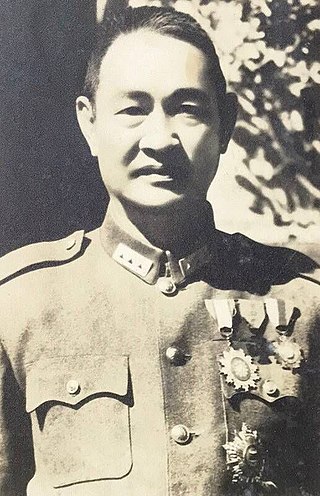
Cheng Qian was a Chinese army officer and politician who held very important military and political positions in both the Republic of China and the People's Republic of China. Educated at the Imperial Japanese Army Academy and Waseda University,he first met Sun Yat-sen in Tokyo,becoming an early supporter. Later,under Chiang Kai-shek,he was one of the most powerful members of the Kuomintang,notably serving as Chief of Staff of the Military Affairs Commission during the Second Sino–Japanese War.

The Republic of China (ROC),or simply China,was based on mainland China from 1912 to 1949 as a sovereign state. The ROC government retreated to Taiwan in 1949 and is now based in Taipei. The Republic of China was established after the 1911 Revolution overthrew the Qing dynasty,ending the imperial history of China. It was ruled by the Kuomintang (KMT) as a one-party state based in Nanjing from 1927 until its official relocation to Taiwan on 7 December 1949 following its defeat by the armed forces of the Chinese Communist Party (CCP) in the Chinese Civil War. The CCP proclaimed the People's Republic of China on 1 October 1949,while the ROC retains control over the "Free Area" and the political status of Taiwan remains in dispute.

Ye Fei was a Philippine-born Chinese military general and politician of the People's Republic of China. Born Sixto Mercado Tiongco in the Philippines to a Chinese father and a Filipino mother,he joined the Chinese Communist Party at a young age and fought many battles as a senior commander of the People's Liberation Army in the Chinese Civil War. At age 40,he was among the first PLA commanders to be awarded the rank of General by the newly established People's Republic of China and later served as Commander-in-Chief of the Chinese Navy. He also served in a number of civilian posts including Governor and Communist Party Chief of Fujian Province,and Minister of Transport.

Chiangism,also known as the Political Philosophy of Chiang Kai-shek,or Chiang Kai-shek Thought,is the political philosophy of President Generalissimo Chiang Kai-shek,who used it during his rule in China under the Kuomintang on both the mainland and Taiwan. It is a right-wing authoritarian nationalist political ideology which is based on mostly Confucian and Tridemist ideologies,and was used in the New Life Movement in China and the Chinese Cultural Renaissance movement in Taiwan. It is a syncretic mix of many political ideologies,including revolutionary nationalism,Tridemism,socialism,militarism,Confucianism,state capitalism,constitutionalism,fascism,authoritarian capitalism,and paternalistic conservatism,as well as Chiang's Methodist Christian beliefs.
References
- ↑ Santaella, Mayco (2022). Popular Music in East and Southeast Asia: Sonic (under)currents and currencies. Petaling Jaya: Sunway University Press.